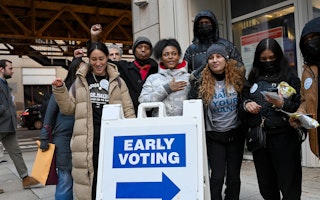In the past few years, Americans who are politically left of center have adopted "progressive" to replace "liberal" as the label of choice, hoping that, as "progressives," we might have a fresh start. Yet the historical and philosophical roots of progressivism cannot be overlooked.
As part of a series of discussions marking the tenth anniversary of the Open Society Institute's U.S. Programs, Bill Moyers and a distinguished panel of commentators addressed the health and future of the progressive movement and discuss three related questions:
- What are the historical and philosophical roots of progressivism?
- Who might develop the public's understanding of these roots, and why is their contribution missing from most public debates?
- What is the health of the intellectual and organizational environment for supporting progressive values, as part of a larger movement of ideas?
A shared sense of history has acted as an intellectual glue for many conservative leaders and activists, binding their diverse interests into an effective movement. Might this work for progressives, who so often organize around and then spilt over discrete policy issues?
It's not just history and philosophy that seem missing from debates about progressivism; it's also the people who think about history and philosophy–scholars, intellectuals, and especially academics. Conservatives frequently complain about the leftist tendencies of professors, but as a practical matter, few progressive academics make their ideas heard in public debates. Why not? Is there a way to harness progressive intellectual resources more effectively?
Further, ideas need organizers who can help them gain traction. Ideas must be communicated to the wider public and adapted to address practical concerns. Foundations, advocacy groups, and grassroots organizations do this work. Among progressives, however, coordination and cooperation often seem to be lacking—individuals and organizations with similarly progressive goals often dilute their power by working alone or even working at cross-purposes. As Americans who are politically left of center move forward, questions of infrastructure, communication, and collaboration are particularly important. The progressivism of the past may contain valuable lessons as we build a strong new movement.
Moderated by Moyers, the roundtable featured:
- Deepak Bhargava, Center for Community Change
- Robert Borosage, Campaign for America’s Future
- Rosa Brooks, Open Society Institute
- Anna Burger, Service Employees International Union
- Eric Foner, Columbia University, Department of History
- Michel Gelobter, Redefining Progress
- Hendrik Hertzberg, The New Yorker
- Alan Jenkins, Opportunity Agenda
- Gara LaMarche, Open Society Institute
- Jal Mehta, New Vision Institute for Policy and Progress
- David Moss, The Tobin Project
- Iara Peng, Young People For
- John Podesta, Center for American Progress
- Stephanie Robinson, The Jamestown Project at Yale
- Joel Rogers, University of Wisconsin Law School
- Andrea Batista Schlesinger, Drum Major Institute for Public Policy
- Katrina vanden Heuvel, The Nation
- Michael Waldman, The Brennan Center for Justice
- Matthew Yglesias, The American Prospect
Read more
Online Hate Speech
New SEC Complaint Says Meta Misled Shareholders over Myanmar Hate

A whistleblower complaint to the SEC argues that the social media giant Meta misrepresented its role in fueling violence against Myanmar’s Rohingya—highlighting the need for more platform accountability for online hate.
Civic Engagement
Bolstering Women and Youth, Linchpins of Democracy

Philanthropy has historically underfunded women and youth. Open Society’s new $50 million investment in their engagement addresses that imbalance—and builds on recent surges in civic engagement crucial to the future of American democracy.
Art and Activism
Reimagining January 6th

The insurrection at the U.S. Capitol left him in a cold sweat. Creating a comic book seemed like one way to reach people not obsessively following the news and spark activism to help defend a multicultural democracy.